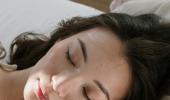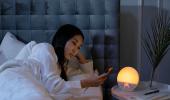Here's why the snooze button on your alarm clock costs you precious sleep every month.

Millions of smartphone users worldwide are losing precious sleep time through excessive snooze alarm use, with heavy users sacrificing nearly an entire night's sleep each month, groundbreaking new research reveals.
A comprehensive analysis of over 3 million sleep sessions across four continents has uncovered alarming patterns in how people wake up, suggesting that the innocent-seeming snooze button may be stealing more rest than previously imagined.
The international study (external link), conducted by researchers at Mass General Brigham -- the largest hospital-based research enterprise in the United States -- tracked sleep data from 21,222 smartphone users over six months, revealing that more than half of all sleep sessions ended with snooze alarm use.
Most concerning, researchers found that heavy snooze users -- those who hit snooze on over 80 per cent of their sleep sessions -- are losing approximately 20 minutes of sleep daily.
'Heavy snooze alarm users pressed the snooze alarm on average four times per day, resulting in more time snoozing,' researchers noted. This translates to roughly six hours of lost sleep per month -- equivalent to losing an entire night's rest.
Women hit snooze more than men
The study uncovered significant gender differences in snooze behaviour, with women demonstrating notably higher usage patterns. Female participants snoozed for an average of 11.5 minutes per session compared to 10.2 minutes for men, representing what researchers classified as a 'large effect size'.
This disparity may stem from women's increased risk for insomnia and greater childcare responsibilities, which can reduce available sleep time and increase reliance on alarm assistance, according to the research team.
Weekend warriors skip the snooze
Sleep patterns revealed striking weekly variations, with Monday through Friday showing peak snooze usage while weekends saw dramatic decreases. Saturday and Sunday snooze sessions dropped by approximately 30 per cent compared to weekdays, suggesting work and school obligations drive much of the snoozing behaviour.
The research also exposed a counterintuitive relationship between sleep duration and snooze frequency.
Contrary to expectations, people who slept longer were more likely to hit snooze repeatedly.
Those sleeping 10 hours or more pressed snooze nearly twice as often as six-hour sleepers.
Geographic and seasonal patterns emerge
International variations painted an interesting picture of global sleep habits.
Swedish users led the snooze frequency at 2.7 times per session, followed by Germans and Americans at 2.5 times. Japanese and Australian users showed the lowest snooze rates at 2.2 times per session.
Seasonal analysis revealed December as the peak snoozing month in northern hemisphere countries while September showed the lowest usage.
Southern hemisphere nations displayed opposite patterns, with July peaks and November lows, likely reflecting natural light exposure variations affecting circadian rhythms.
Sleep timing matters
The study identified crucial connections between bedtime consistency and snooze behaviour.
Users who went to bed earlier than usual required fewer snooze alarms while those with delayed bedtimes showed increased snoozing -- sometimes exceeding seven alarm hits per morning.
Late sleepers proved particularly snooze-dependent. People falling asleep at 10 pm averaged nearly five snooze sessions compared to 2.5 for those sleeping at 8 pm, suggesting shift workers and night owls face greater morning awakening challenges.
Expert concerns about sleep quality
Sleep experts have long cautioned against snooze alarm use, arguing the fragmented sleep provides poor quality rest. The practice contradicts recommended sleep hygiene, which emphasises consolidated, uninterrupted sleep periods.
The research team noted that their findings represent 'objective snooze alarm data' rather than self-reported estimates, providing unprecedented accuracy in understanding global snoozing behaviour.
Previous studies using self-reports had estimated 22 to 27 minutes of daily snoozing, significantly higher than the 11-minute average found in this smartphone-based analysis.
Health implications under investigation
While the study establishes clear patterns of snooze usage worldwide, researchers emphasised that health impacts remain unclear. 'Future research is needed to understand the impact of snooze alarm use on daytime performance,' the team concluded.
The dataset, spanning users from the United States, United Kingdom, Japan, Australia and Germany, represents the largest global examination of snooze alarm behaviour to date.
Researchers classified participants into three categories -- heavy users (45.2 per cent), moderate users (27.9 per cent) and light users (26.9 per cent).
The snooze line
Given that snooze alarm use affects over half of smartphone users globally and potentially costs heavy users six hours of sleep monthly, public health experts may need to reconsider wake-up recommendations.
The study suggests messages discouraging snooze use in favour of setting later, single alarms could prove beneficial for sleep health campaigns.
As millions continue reaching for that tempting snooze button each morning, this research provides the first comprehensive picture of a behaviour that may be more costly to our rest than previously understood.











